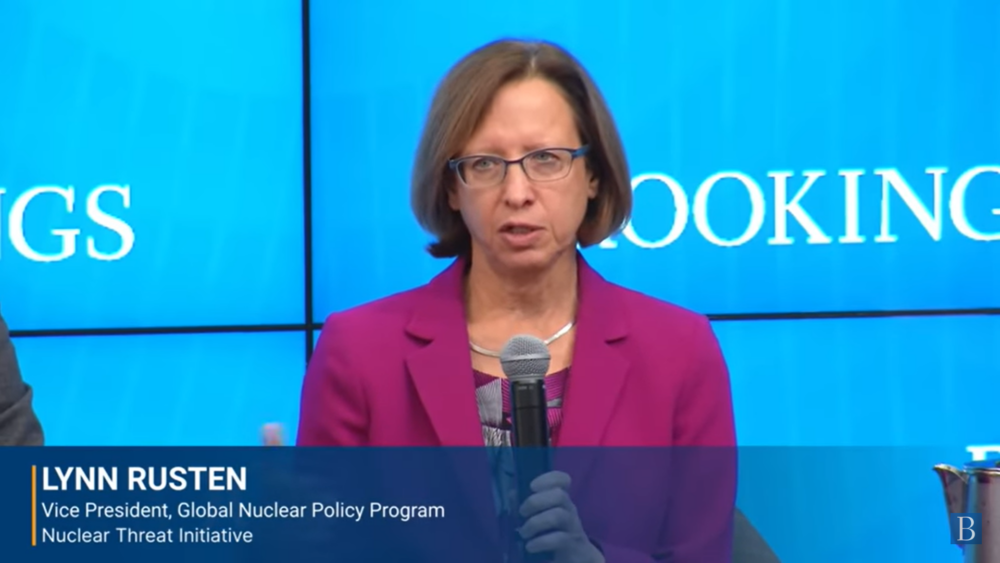
Sam Nunn
Co-Founder and Co-Chair, NTI
NUNN URGES U.S. AND RUSSIA TO REMOVE ALL NUCLEAR WEAPONS FROM HAIR-TRIGGER: “IT IS TIME TO FIND A SAFER FORM OF DETERRENCE AND SECURITY”
Former Senator Sam Nunn, co-chairman of the Nuclear Threat Initiative, today called for the Presidents of the United States and Russia to reduce each country’s reliance on nuclear weapons and end their nations’ Cold War nuclear force postures by removing all nuclear weapons from hair-trigger status. Nunn made the comments in a speech to the Carnegie International Non-Proliferation Conference in Washington, D.C.
In the speech, Nunn said, “We are running the irrational risk of an Armageddon of our own making. It is time to find a safer form of deterrence and security. If both the United States and Russia remove nuclear weapons from hair-trigger status, we can immediately eliminate the threat of rapid assured destruction and dramatically reduce the chance of an accidental, mistaken, or unauthorized launch. By taking this step, we will de-emphasize the role of nuclear weapons and make them less relevant…The bottom line for America and Russia – keeping our nuclear weapons on hair trigger now increases the risk it was designed to reduce.”
Noting that then-Governor George W. Bush said in 2000 that as President, he would ask for an assessment of what we can safely do to lower the alert status of our forces, Nunn said, “If this assessment has been requested or received, I missed it. But I have a proposal. Candidate Bush said we should remove ‘as many weapons as possible’ from hair-trigger status. I propose that today ‘as many weapons as possible’ should mean ‘all of them.’”
Nunn urged the Presidents of the United States and Russia to order the military and defense officials of each country to present to the Presidents within six months a set of options for removing all nuclear weapons of both countries from hair-trigger status. Nunn said that these officials should jointly:
Nunn suggested a number of possible options for beginning the removal of all nuclear weapons from hair-trigger alert, including: 1) Immediately ordering that the warheads from each side scheduled to be taken out under the 2002 Treaty of Moscow be taken off alert; 2) Limiting the number of hair-trigger status warheads each side can deploy to several hundred; and 3) A reciprocal approach where the U.S. would remove all land-based missiles from hair-trigger alert, and Russia would do the same for its sea-based missiles. “This posture would be designed to assure that the nuclear weapons of both sides would be survivable, which would reduce the pressure to launch on warning, and thus increase decision times for both nations’ leaders,” he said.
Nunn said, “Even though our destructive force will remain mutual and assured, if we have no weapons on hair-trigger status, the decision to launch will be slower, more deliberate and far less likely. It was Thomas Jefferson who wrote: ‘When angry, count to ten before you speak; if very angry, a hundred.’ Jefferson understood the value of increasing decision time. I suspect he would advise us to count even higher than a hundred before launching a nuclear missile.”
Nunn said that removing weapons from hair-trigger alert is an essential first step in coming out from under the shadow of Mutual Assured Destruction toward an expanded doctrine of “Mutual Assured Safety,” an idea first advanced by former Defense Secretary Bill Perry. Under this approach, both the U.S. and Russia would shift their nuclear weapons doctrine from one that “seeks security by threatening destruction” toward one that “seeks security by threat reduction.”
He said, “Let history show that we reduced the chance of a disastrous catastrophic mistake; that we showed the world that we were reducing our reliance on nuclear weapons; and that we generated the good will we needed to gain the cooperation of each other and other nations in preventing nuclear dangers and catastrophic terrorism.” Nunn said, “Let me be clear: I am not saying that if we set a shining example by reducing our dependence on nuclear weapons that Iran and North Korea and others will suddenly see the light and abandon their nuclear programs. This is not likely, and it is not my point. I do believe, however, that if the United States and Russia de-emphasize the role of nuclear weapons in our own security:
The full text of Senator Nunn’s speech can be found at www.nti.org.
###
Sign up for our newsletter to get the latest on nuclear and biological threats.
The DoD’s new CWMD strategy, last updated in 2014, comes at a time when longstanding norms against nuclear use are being tested.
The paper highlights the need for renewed attention to the catastrophic effects of nuclear conflict as a crucial step toward reducing the risk of nuclear use.
A new report from NTI highlights the critical need for a global diplomatic approach to address growing cyber risks, including, where possible, through cooperation between the United States and Russia.


